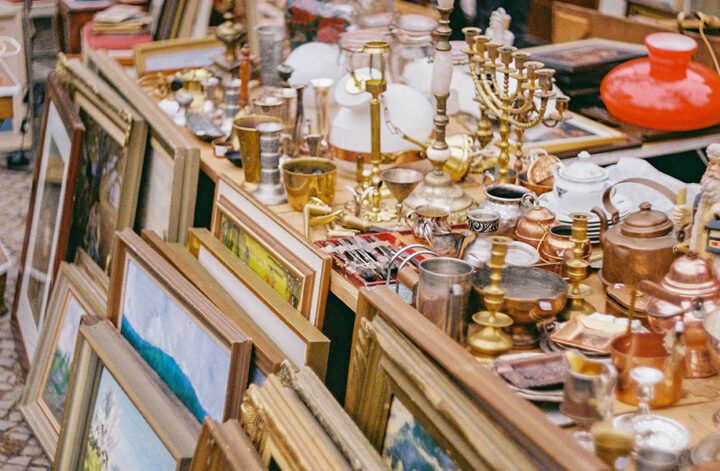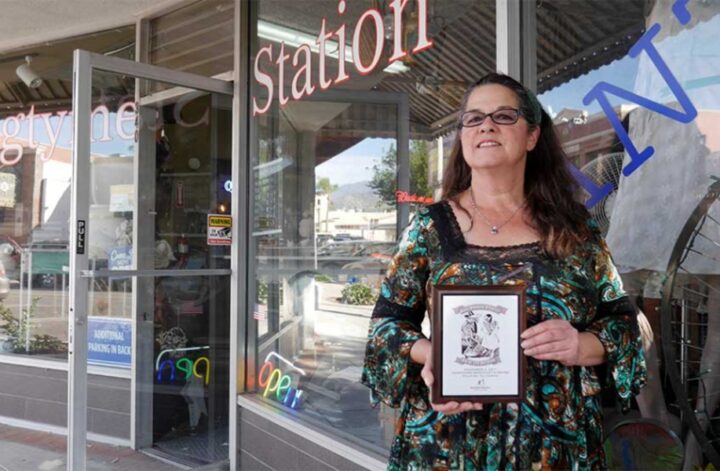The VU team loves a good live auction. It’s got all the elements of a good adventure: the inspection of the auction lots, the note taking a list of things you’re interested in, the watching and the bidding and of course the thrill of victory and the agony of defeat. We’ve put our brains together and compiled some auction tips because we want you to get in there and have some fun. As long as you’re not bidding against one of us…

Some of these auction tips apply only to live auctions. Some also apply to virtual auctions too. (We have tips for buying vintage online as well.)
The Official Vintage Unscripted List of 23 Auction Tips
- All’s fair in love and bidding. Your money is as good as anyone else’s money. If you want something, you can bid on it.
- Auctions have previews either the day ahead or early on the same day of the auction. Do not bid on anything you have not examined, even if the bidding seems too good to be true. Every one of us can share a story about how that ended poorly. Of all the auction tips, this is the one we wish we knew when we started!
- Bring your camera or smartphone with you to take pictures of the items you are interested in – that way, you can do advance research on the items before the sale. Or look them up onsite.
- Items are sold individually or in lots ranging from a small tray of items to a whole table of them. Usually there is a tag or label that tells you what is being sold together.
- If there are box lots, peek at what’s on the bottom of the box. We don’t do it and we don’t suggest doing it, but sometimes potential bidders will rearrange the contents so the good stuff is hidden from view.
- Don’t buy big things without measuring. And without knowing how you are going to get it home.
- Dust doesn’t necessarily mean something is old. It just means it’s dusty. Pick it up and handle it to see how old it really is.
- Textiles and rugs are often good buys at auctions. Most textiles and definitely any rugs should be cleaned or stored at freezing temperatures for a few days before they are brought into your home. Beautiful rugs are good. Moths that hide in them are not.
- Make a list of lots you would like to bid on with a bidding limit. Setting a ceiling helps prevent your competitive streak from taking over and paying more than you want for something.
- Auction houses add a buyer’s premium, a percentage of the sale price, to the final purchase amount. The amount varies, but always be aware of that when you are bidding.
- Keep of running total of what you’ve bought so you know how much you’ve spent and so you remember to find all your lots at the end of the auction. Auction houses will usually write your bidder number on your purchases, but they don’t group your things together, so you will have a treasure hunt and it’s easy to forget a treasure.
- Be an observer. Get to know the players. Who are the dealers who buy lots of things? Who are the collectors who came for one item and are determined to get it? Who are the people buying things for their own use? Auction houses tend to have some of the same buyers at all their sales. You can help figure out your bidding strategy if you know how others bid. Another good auction tip is to watch and learn from the power players.
- If you are new to auctions, you may want to let others start the bidding on items you are interested in. The auctioneer will start the auction at a certain price. If no one bids right away, he or she will drop the price slightly until someone starts bidding. By allowing other, more seasoned bidders start the bidding, you will probably have a better chance of winning the item at a better price, than if you started the bidding at a price closer to what you are willing to pay.
- Sit or stand in the front, near the auctioneer. This allows you to see clearly and hear about the items that are being put up for bid, and it helps to ensure you are seen and acknowledged when you place your bid.
- Put on your poker face! Really. If you show excitement about finding an item you want to bid on, you call more attention to it (and to you) and chances are more people will bid against you.
- If you are there for one specific lot, you know approximately what it’s worth and how much you are willing to pay, don’t be afraid to let everyone know you plan to take it home by raising your number and holding it up rather than raise and lower it to enter a new bid. Sometimes this display of auction determination will get less avid bidders to drop out earlier.
- Remember that a bid is a final purchase. Only bid on things you really want to take home with you – you can’t change your mind after winning the bid.
- Don’t be a sniper! No one likes a sniper and it will give you a bad reputation among the people who attend the auctions. A sniper is someone who places their first bid at the very last minute before bidding closes. If you are truly interested in an item, it’s better to bid on it at some point before the bidding ends for that item. At that point, if you bid at the very end and win the auction, you are not seen as a sniper – mainly because you had already been invested in the bidding.
- Lose graciously. If you lose an item to another bidder, it’s best to do so with grace. Don’t show emotion or complain – you’ll only attract attention to yourself. You may see the same people attending all the same auctions you attend, so by avoiding calling attention to yourself, you may be able to avoid a potential rivalry.
- Make sure to bring along anything you need to get your purchases home safely. We cannot stress this auction tip enough. Things like boxes or bags to contain small purchases, bubble wrap or other padding to protect delicate items, furniture blankets to protect the surfaces of furniture, and rope or tie-downs in case you need to haul something home on the roof of your vehicle. Did we mention make sure your vehicle is large enough to fit your purchases?
- Some auctions can be very long. Make sure you plan enough time in your schedule to stay until the items you are interested come up for bid. Bring water, snacks, and even a portable folding chair with you for the day-long auctions. If the auction is being held outside, you’ll also want to make sure to dress appropriately for whatever the weather may be. Bring an umbrella for rainy days or to provide shade on hot and sunny days.
- Get to know your local auctioneers. When you establish a relationship with them, they’ll know the kinds of things you are looking for and oftentimes will give you advance notice of upcoming auctions that have items you like. Sometimes you can even preview those items long before the preview is open to the public. It’s nice to have that “inside information,” the best auction tips are the ones you get from the auctioneer.
- Some auction houses have a regular schedule of auctions each month, and the auctions they hold are often within their specialty. For example, some auction houses deal with commercial businesses, some with liquidating estates, others specialize in farm auctions. Getting to know your local auction houses will help you decide with auctions to attend. Don’t be afraid to branch out. Attend auctions in rural communities, auctions in industrial areas of the city, or auctions in affluent neighborhoods. You never know what you will find!
Scenes from an auction in Central Massachusetts.


















1 comment
I have a funny story about an auction we attended years ago with friends. I had my eye on a flow blue platter and started bidding against someone else when it came up. The auctioneer stopped mid-bidding and asked if I knew the person sitting next to me. Why, it was my friend! She quickly stopped bidding and we all got a good laugh as well as a lesson in Auctions 101!